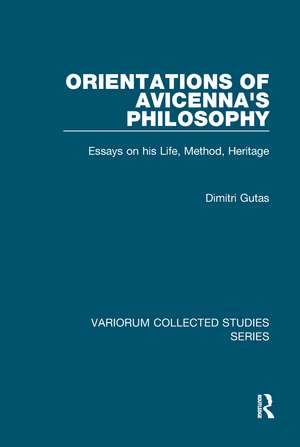Orientations of Avicenna's Philosophy: Essays on his Life, Method, Heritage: Variorum Collected Studies
Autor Dimitri Gutasen Limba Engleză Hardback – 5 dec 2014
Din seria Variorum Collected Studies
-
 Preț: 313.38 lei
Preț: 313.38 lei -
 Preț: 311.41 lei
Preț: 311.41 lei -
 Preț: 308.04 lei
Preț: 308.04 lei -
 Preț: 325.68 lei
Preț: 325.68 lei -
 Preț: 406.12 lei
Preț: 406.12 lei -
 Preț: 311.18 lei
Preț: 311.18 lei -
 Preț: 325.31 lei
Preț: 325.31 lei -
 Preț: 396.01 lei
Preț: 396.01 lei - 9%
 Preț: 1039.89 lei
Preț: 1039.89 lei -
 Preț: 266.20 lei
Preț: 266.20 lei -
 Preț: 358.42 lei
Preț: 358.42 lei - 9%
 Preț: 938.10 lei
Preț: 938.10 lei -
 Preț: 351.48 lei
Preț: 351.48 lei - 9%
 Preț: 938.86 lei
Preț: 938.86 lei -
 Preț: 335.37 lei
Preț: 335.37 lei - 9%
 Preț: 937.14 lei
Preț: 937.14 lei -
 Preț: 351.42 lei
Preț: 351.42 lei -
 Preț: 328.48 lei
Preț: 328.48 lei - 38%
 Preț: 766.84 lei
Preț: 766.84 lei - 23%
 Preț: 315.48 lei
Preț: 315.48 lei - 36%
 Preț: 740.06 lei
Preț: 740.06 lei - 38%
 Preț: 764.20 lei
Preț: 764.20 lei - 39%
 Preț: 684.75 lei
Preț: 684.75 lei - 29%
 Preț: 247.40 lei
Preț: 247.40 lei - 37%
 Preț: 488.89 lei
Preț: 488.89 lei - 38%
 Preț: 766.91 lei
Preț: 766.91 lei - 38%
 Preț: 769.51 lei
Preț: 769.51 lei - 38%
 Preț: 769.85 lei
Preț: 769.85 lei - 36%
 Preț: 823.43 lei
Preț: 823.43 lei - 25%
 Preț: 225.28 lei
Preț: 225.28 lei - 27%
 Preț: 225.54 lei
Preț: 225.54 lei - 38%
 Preț: 767.07 lei
Preț: 767.07 lei - 38%
 Preț: 764.20 lei
Preț: 764.20 lei - 36%
 Preț: 736.38 lei
Preț: 736.38 lei - 34%
 Preț: 738.43 lei
Preț: 738.43 lei - 27%
 Preț: 226.52 lei
Preț: 226.52 lei - 37%
 Preț: 491.66 lei
Preț: 491.66 lei - 37%
 Preț: 485.78 lei
Preț: 485.78 lei - 37%
 Preț: 485.78 lei
Preț: 485.78 lei - 38%
 Preț: 766.34 lei
Preț: 766.34 lei - 36%
 Preț: 739.17 lei
Preț: 739.17 lei - 34%
 Preț: 473.94 lei
Preț: 473.94 lei - 18%
 Preț: 843.63 lei
Preț: 843.63 lei - 38%
 Preț: 774.91 lei
Preț: 774.91 lei - 38%
 Preț: 769.92 lei
Preț: 769.92 lei - 38%
 Preț: 764.20 lei
Preț: 764.20 lei - 50%
 Preț: 488.81 lei
Preț: 488.81 lei - 36%
 Preț: 488.49 lei
Preț: 488.49 lei - 38%
 Preț: 769.10 lei
Preț: 769.10 lei - 38%
 Preț: 766.99 lei
Preț: 766.99 lei
Preț: 770.31 lei
Preț vechi: 1158.18 lei
-33% Nou
Puncte Express: 1155
Preț estimativ în valută:
147.42€ • 160.07$ • 123.83£
147.42€ • 160.07$ • 123.83£
Comandă specială
Livrare economică 01-15 aprilie
Doresc să fiu notificat când acest titlu va fi disponibil:
Se trimite...
Preluare comenzi: 021 569.72.76
Specificații
ISBN-13: 9781472436337
ISBN-10: 1472436334
Pagini: 384
Dimensiuni: 150 x 224 mm
Greutate: 0.79 kg
Ediția:1
Editura: Taylor & Francis
Colecția Routledge
Seria Variorum Collected Studies
Locul publicării:Oxford, United Kingdom
ISBN-10: 1472436334
Pagini: 384
Dimensiuni: 150 x 224 mm
Greutate: 0.79 kg
Ediția:1
Editura: Taylor & Francis
Colecția Routledge
Seria Variorum Collected Studies
Locul publicării:Oxford, United Kingdom
Cuprins
Contents: Foreword. Life and Works: Avicenna: biography; Avicenna's Maa,Ahab, with an appendix on the question of his date of birth; Texts from Avicenna's library in a copy by E'Abd-ar-RazzAuq aa'GBP-a' iA!nAua,"A" (notes and texts from Cairo manuscripts, II); Avicenna's marginal glosses on De anima and the Greek commentatorial tradition; Avicenna's Eastern ('Oriental') philosophy: nature, contents, transmission. Method: The logic of theology (kalAum) in Avicenna; The empiricism of Avicenna; Medical theory and scientific method in the age of Avicenna. Epistemology: Avicenna: the metaphysics of the rational soul; Intuition and thinking: the evolving structure of Avicenna's epistemology; Imagination and transcendental knowledge in Avicenna; Intellect without limits: the absence of mysticism in Avicenna; Avicenna: mysticism and the question of his 'Oriental' philosophy. The Study of Avicenna and His Heritage: The heritage of Avicenna: the golden age of Arabic philosophy, 1000 - ca. 1350; Philosophy in the 12th century: one view from Baghdad, or the repudiation of al-GhazAulA"'; Ibn a'--ufayl on Ibn SA"nAu's Eastern philosophy; The study of Avicenna. Status quaestionis atque agenda. Indexes.
Notă biografică
Dimitri Gutas is Professor of Arabic and Graeco-Arabic at Yale University, USA where he studies and teaches classical Arabic and the pre-modern intellectual tradition in Islamic civilization. In addition to his lexicographical interests in Graeco-Arabic studies, he has devoted a large part of his scholarly career to the edition and study of Greek philosophical texts translated into Arabic and their influence in the Islamic world. In this field he has published Greek Wisdom Literature in Arabic Translation. A Study of the Graeco-Arabic Gnomologia (New Haven 1975), Greek Philosophers in the Arabic Tradition (Aldershot, Hampshire 2000), and has been involved from the beginning as co-editor in Project Theophrastus. Within Arabic philosophy, he has concentrated in particular on its greatest exponent, Ibn Sina (known as Avicenna in the medieval Latin world), on whom he wrote the fundamental Avicenna and the Aristotelian Tradition and Introduction to Reading Avicenna's Philosophical Works.
Descriere
This volume, a major new research tool, brings together seventeen studies on Avicenna by Dimitri Gutas, written over the past twenty-five years. They aim to establish Avicenna’s historical and philosophical context as a means to determining his philosophical project and the orientations of his thought. They deal with his life and works, his method, his epistemology, and his later reception in the Islamic world, ending with an essay on the state of the field of Avicennan studies and future agenda.
